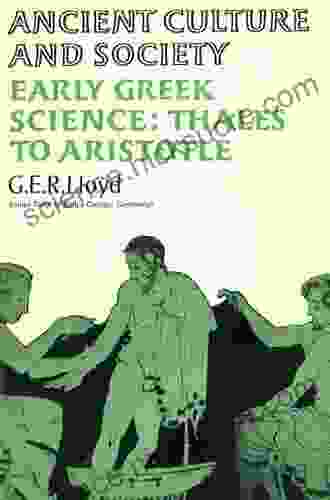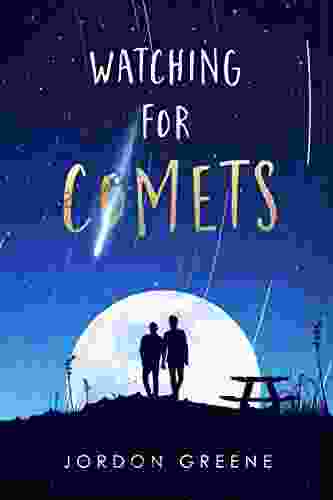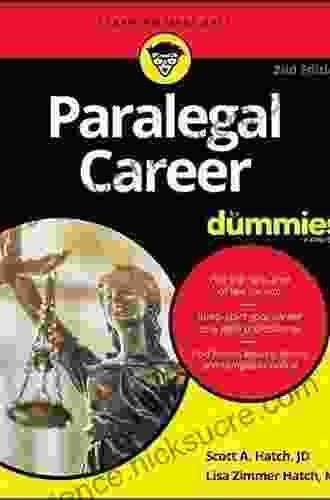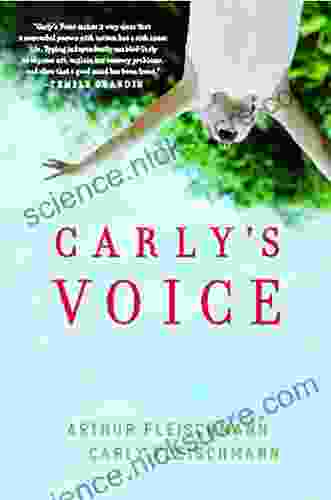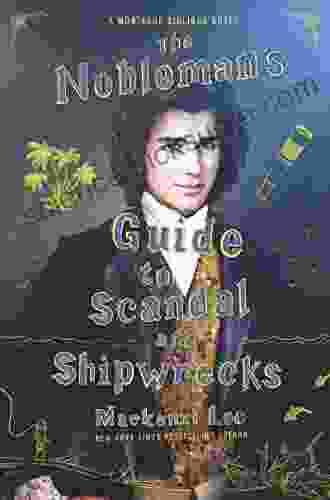Thales to Aristotle: Exploring the Dawn of Western Philosophy

The ancient Greek civilization laid the foundation for much of Western thought and culture, and its philosophers played a pivotal role in shaping our understanding of the world. From the enigmatic Thales to the towering intellect of Aristotle, these thinkers grappled with fundamental questions about the nature of reality, the human condition, and the purpose of life. In this article, we embark on a journey through the lives and ideas of three of the most influential ancient Greek philosophers: Thales, Anaximander, and Aristotle.
Thales: The First Philosopher
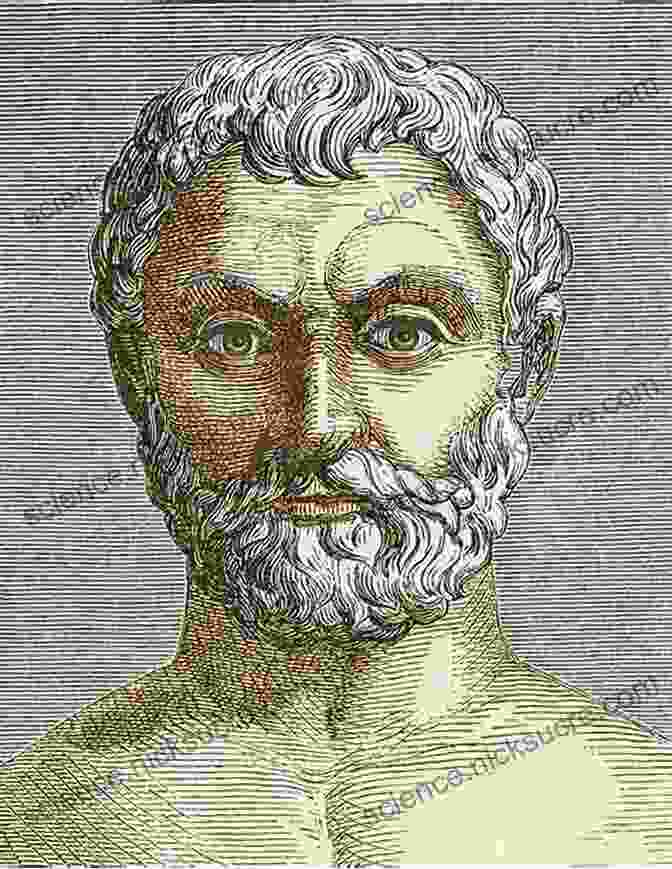
4.7 out of 5
| Language | : | English |
| File size | : | 2243 KB |
| Text-to-Speech | : | Enabled |
| Screen Reader | : | Supported |
| Enhanced typesetting | : | Enabled |
| Word Wise | : | Enabled |
| Print length | : | 176 pages |
Thales of Miletus, born around 624 BC, is widely regarded as the first philosopher. As a mathematician, astronomer, and statesman, his curiosity extended across various disciplines. Thales is famous for his cosmogony, postulating that water was the fundamental substance from which all things originated. This theory was based on his observations of the world around him, particularly the fluidity and transformative properties of water.
Anaximander: The Eternal and Boundless
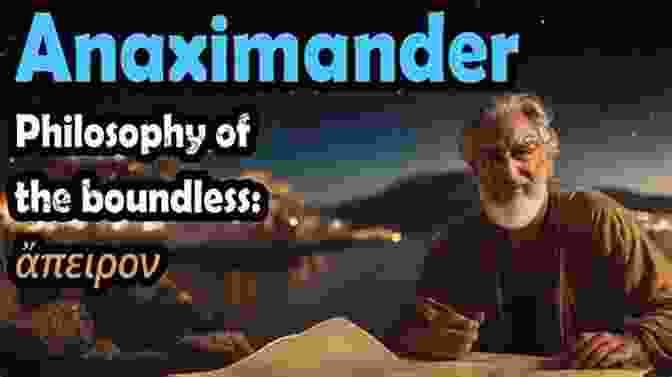
Anaximander, a younger contemporary of Thales, expanded upon his mentor's ideas and developed a more comprehensive cosmological theory. He believed that the origin of all things lay not in a single element but in an infinite and undefined substance he called the "apeiron." According to Anaximander, the apeiron was constantly in motion, giving rise to the diverse forms of the world we perceive.
Aristotle: The Master of Metaphysics
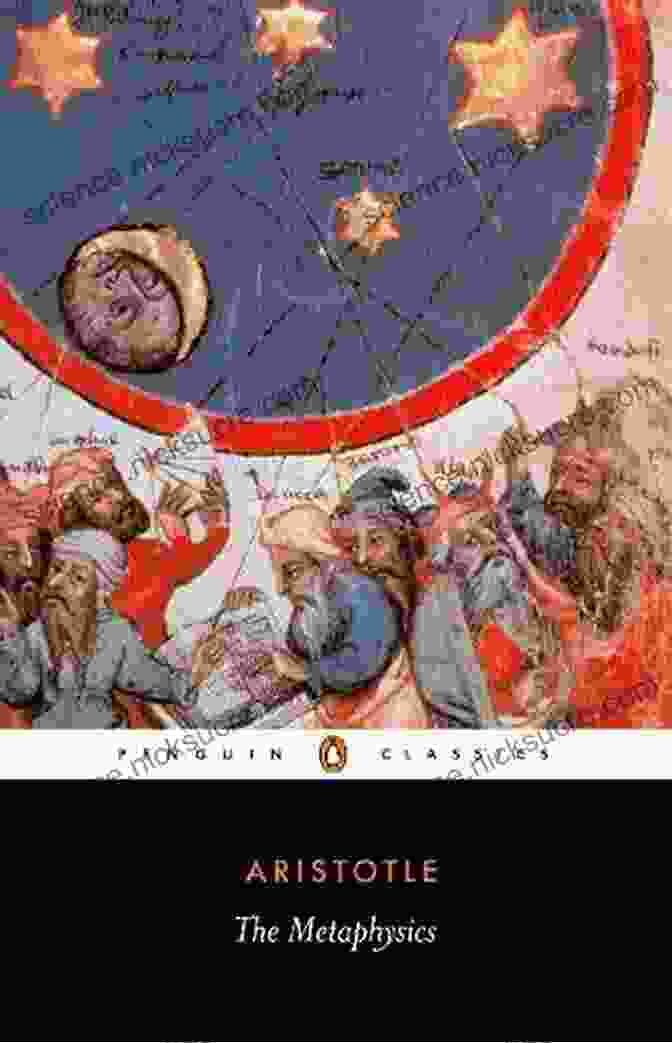
Born in Stagira, Macedonia, in 384 BC, Aristotle is considered one of the greatest philosophers of all time. As a student of Plato, Aristotle was initially drawn to metaphysics, the study of fundamental questions about existence and the nature of reality. He developed a vast and intricate system of thought that encompasses logic, physics, ethics, and politics.
Aristotle's Metaphysics
Aristotle's metaphysics is based on the concept of substance. He argued that all things in the universe are composed of two essential elements: form and matter. Form gives things their distinct qualities and essence, while matter provides them with their physical presence. This theory marked a profound shift in philosophical thought, moving away from the monistic views of earlier philosophers.
Aristotle's Ethics
Aristotle's ethical philosophy focuses on achieving happiness (eudaimonia) through the cultivation of virtues. He believed that the highest form of happiness is not merely a state of pleasure or contentment but a life lived in accordance with reason and virtue. Aristotle identified four cardinal virtues: prudence, courage, temperance, and justice.
Aristotle's Politics
Aristotle's political philosophy places great emphasis on the role of the state. He argued that the state is a necessary institution for promoting the common good and ensuring the flourishing of its citizens. Aristotle believed that the ideal state is a constitutional democracy that balances the interests of all classes.
The ancient Greek philosophers from Thales to Aristotle laid the groundwork for Western thought and philosophy. Their ideas about the nature of reality, the human condition, and the purpose of life continue to shape our understanding of the world today. From Thales's primordial water to Anaximander's boundless apeiron and Aristotle's complex metaphysics and ethics, these thinkers left an indelible mark on human intellectual history. Their legacy serves as a testament to the enduring power of philosophical inquiry and the human quest for knowledge.
4.7 out of 5
| Language | : | English |
| File size | : | 2243 KB |
| Text-to-Speech | : | Enabled |
| Screen Reader | : | Supported |
| Enhanced typesetting | : | Enabled |
| Word Wise | : | Enabled |
| Print length | : | 176 pages |
Do you want to contribute by writing guest posts on this blog?
Please contact us and send us a resume of previous articles that you have written.
 Fiction
Fiction Non Fiction
Non Fiction Romance
Romance Mystery
Mystery Thriller
Thriller SciFi
SciFi Fantasy
Fantasy Horror
Horror Biography
Biography Selfhelp
Selfhelp Business
Business History
History Classics
Classics Poetry
Poetry Childrens
Childrens Young Adult
Young Adult Educational
Educational Cooking
Cooking Travel
Travel Lifestyle
Lifestyle Spirituality
Spirituality Health
Health Fitness
Fitness Technology
Technology Science
Science Arts
Arts Crafts
Crafts DIY
DIY Gardening
Gardening Petcare
Petcare Jeff Maynard
Jeff Maynard George Monbiot
George Monbiot Amy Edelstein
Amy Edelstein Taquetta Baker
Taquetta Baker Rosemarie Anderson
Rosemarie Anderson Lingo Mastery
Lingo Mastery Alan Graham
Alan Graham Dawn Sakamoto Paiva
Dawn Sakamoto Paiva Len Sperry
Len Sperry Chris Klug
Chris Klug Mark Booth
Mark Booth Vernon Coleman
Vernon Coleman Terry L Duran
Terry L Duran Mike Rothschild
Mike Rothschild David King
David King Barbara Oehlberg
Barbara Oehlberg Sam J Fires
Sam J Fires Steven Horak
Steven Horak Robert Heidler
Robert Heidler Josh Kilmer Purcell
Josh Kilmer Purcell S A Klopfenstein
S A Klopfenstein James Witts
James Witts Saul Rip
Saul Rip Nicholas Romanov
Nicholas Romanov Jacqueline Tourville
Jacqueline Tourville Cynthia Clumeck Muchnick
Cynthia Clumeck Muchnick Alan Lawrence Sitomer
Alan Lawrence Sitomer Will Storr
Will Storr Dennis Jarecke
Dennis Jarecke James A Michener
James A Michener Celeste Jones
Celeste Jones Alana Mclaren
Alana Mclaren Po Bronson
Po Bronson Dmitry Zinoviev
Dmitry Zinoviev Publishdrive Edition Kindle Edition
Publishdrive Edition Kindle Edition Michael Sidgwick
Michael Sidgwick William A Kaplin
William A Kaplin Thomas Metzinger
Thomas Metzinger Jerry Robeson
Jerry Robeson Alan Vermilye
Alan Vermilye Al Marlowe
Al Marlowe Howard Greene
Howard Greene E A Koetting
E A Koetting Dave Heller
Dave Heller Michael Gray
Michael Gray Kareem Abdul Jabbar
Kareem Abdul Jabbar Conor Daly
Conor Daly Jerry Robertson
Jerry Robertson Gary Player
Gary Player Judy Jewell
Judy Jewell Anders Halverson
Anders Halverson Scott Surovich
Scott Surovich Angelina Wilson
Angelina Wilson Samuel Carbaugh
Samuel Carbaugh Edupan7 Publishing
Edupan7 Publishing John J Miller
John J Miller Sandy Lindsey
Sandy Lindsey Joe Clement
Joe Clement Farlex International
Farlex International Snap Summaries
Snap Summaries Aileen Evans
Aileen Evans Molly Absolon
Molly Absolon W E Fairbairn
W E Fairbairn Kevin B Shearer
Kevin B Shearer Tina Dreffin
Tina Dreffin Michael W King
Michael W King Peter Irvine
Peter Irvine Aiva Books
Aiva Books Jill Homer
Jill Homer Larry Wasserman
Larry Wasserman Jacob K Olupona
Jacob K Olupona Alan Murchison
Alan Murchison Aimee Aristotelous
Aimee Aristotelous Jill Stamm
Jill Stamm I Johnson
I Johnson Benjamin Johnston
Benjamin Johnston Albert Einstein
Albert Einstein Clint Emerson
Clint Emerson Thomas Kurz
Thomas Kurz Erin Ekins
Erin Ekins Alan R Hall
Alan R Hall Lexie Scott
Lexie Scott Vera Nazarian
Vera Nazarian Shing Tung Yau
Shing Tung Yau Lisa Marasco
Lisa Marasco Arnold Haultain
Arnold Haultain Douglas T Hall
Douglas T Hall Aidan Comerford
Aidan Comerford Percy Boomer
Percy Boomer G E R Lloyd
G E R Lloyd Jay Speight
Jay Speight Stephen M Camarata
Stephen M Camarata Betsy Tobin
Betsy Tobin Jamie Baulch
Jamie Baulch Margit Ystanes
Margit Ystanes Dr Guy Leschziner
Dr Guy Leschziner Craig Childs
Craig Childs Celeste Headlee
Celeste Headlee Mike Martin
Mike Martin Antipodean Writer
Antipodean Writer Gordon H Orians
Gordon H Orians Akil Palanisamy
Akil Palanisamy Vanessa Ogle
Vanessa Ogle Emily Harris Adams
Emily Harris Adams Contractor Education Inc
Contractor Education Inc Mark Occhilupo
Mark Occhilupo Robert M Emerson
Robert M Emerson Andrew Blum
Andrew Blum Micky Ward
Micky Ward Matt Mosher
Matt Mosher Dr David Geier
Dr David Geier Takuan Soho
Takuan Soho Tim Gallagher
Tim Gallagher David F Kelly
David F Kelly Bob Plott
Bob Plott Kerry Diamond
Kerry Diamond Brian Mills
Brian Mills Christos A Djonis
Christos A Djonis Doug Gelbert
Doug Gelbert Charles J Thayer
Charles J Thayer Zondervan
Zondervan Michael Domican
Michael Domican Alan Booth
Alan Booth Habeeb Quadri
Habeeb Quadri Joanne Webb
Joanne Webb Janice Selekman
Janice Selekman Dimitri Loose
Dimitri Loose Natazha Raine O Connor
Natazha Raine O Connor Carl Gustav Jung
Carl Gustav Jung Frances E Jensen
Frances E Jensen We Fairbairn
We Fairbairn Paul G Schempp
Paul G Schempp Gordon R Dickson
Gordon R Dickson Collins Easy Learning
Collins Easy Learning Kai Nacke
Kai Nacke Lisa Kenney
Lisa Kenney Satya Sundar Sethy
Satya Sundar Sethy Erin Lovelace
Erin Lovelace Lisa Newton
Lisa Newton David Crabtree
David Crabtree Cindy Hudson
Cindy Hudson Tom Shachtman
Tom Shachtman Ainsley Arment
Ainsley Arment Donna Morang
Donna Morang Eddy Starr Ancinas
Eddy Starr Ancinas Olivia Gentile
Olivia Gentile Lex Croucher
Lex Croucher Ken Denmead
Ken Denmead Lauren Blackwood
Lauren Blackwood Matthew Mcbee
Matthew Mcbee John Feinstein
John Feinstein Amelia Mayer
Amelia Mayer David D Burns
David D Burns Florence Williams
Florence Williams Gavin Francis
Gavin Francis Jay Revell
Jay Revell Charles B White
Charles B White Elizabeth Thompson
Elizabeth Thompson Edward A Tiryakian
Edward A Tiryakian Kevin Williams
Kevin Williams Hervey Garrett Smith
Hervey Garrett Smith Alan S Gurman
Alan S Gurman Christopher Hellman
Christopher Hellman Cat Warren
Cat Warren Magnus Thollander
Magnus Thollander Kelly Jensen
Kelly Jensen Alice Oseman
Alice Oseman Julie Bradley
Julie Bradley Bob Mayer
Bob Mayer John Bird
John Bird Louis Schubert
Louis Schubert Brandy Roon
Brandy Roon Howard Maxwell
Howard Maxwell Gina Guddat
Gina Guddat Aphra Behn
Aphra Behn Lo Bosworth
Lo Bosworth Margaret J Wheatley
Margaret J Wheatley Noel St Clair
Noel St Clair Jonathan Gottschall
Jonathan Gottschall Steve Moore
Steve Moore Anthonissa Moger
Anthonissa Moger Robin Mckinley
Robin Mckinley Courtney Macavinta
Courtney Macavinta Massad Ayoob
Massad Ayoob Joyce Burkhalter Flueckiger
Joyce Burkhalter Flueckiger Suze Guillaume
Suze Guillaume Daniel C Okpara
Daniel C Okpara Martin Luther King Jr
Martin Luther King Jr Morgan Lyle
Morgan Lyle Belinda Luscombe
Belinda Luscombe Erica Westly
Erica Westly Alan Lightman
Alan Lightman John Riley
John Riley Ged Jenkins Omar
Ged Jenkins Omar Francesca Lia Block
Francesca Lia Block S Connolly
S Connolly Jacqueline Fitzpatrick
Jacqueline Fitzpatrick Damon Lee
Damon Lee Elaine Howard Ecklund
Elaine Howard Ecklund Andrew Jamieson
Andrew Jamieson Al Yellon
Al Yellon Sarah Hendrickx
Sarah Hendrickx Melissa Bashardoust
Melissa Bashardoust James F Boswell
James F Boswell Susan B Lovejoy
Susan B Lovejoy Al Roker
Al Roker Truman Everts
Truman Everts Alastair Humphreys
Alastair Humphreys Marcus Chown
Marcus Chown George Buehler
George Buehler Christopher Scordo
Christopher Scordo Lecile Harris
Lecile Harris Arnold Yates
Arnold Yates David Roberts
David Roberts Jonathan White
Jonathan White Hannah Ewens
Hannah Ewens John Leo
John Leo Juliet Marillier
Juliet Marillier Rob Casey
Rob Casey Gayle Peterson
Gayle Peterson Robert A Sadowski
Robert A Sadowski Al Barkow
Al Barkow Alan E Sparks
Alan E Sparks Alex Light
Alex Light Kate Bettison
Kate Bettison Gary R Varner
Gary R Varner Mariam N Ottimofiore
Mariam N Ottimofiore Christopher Gavigan
Christopher Gavigan David Jason
David Jason Michael D Rich
Michael D Rich Noha Mellor
Noha Mellor Deborah Harkness
Deborah Harkness Kiersten White
Kiersten White Andre Agassi
Andre Agassi Michael Casey
Michael Casey Peter Hathaway Capstick
Peter Hathaway Capstick Alan Gelb
Alan Gelb Aileen Nielsen
Aileen Nielsen Barbara Scott
Barbara Scott Ilan Dvir
Ilan Dvir Sophia Joy
Sophia Joy Katharine Graves
Katharine Graves E Cheng
E Cheng Dan Dipiro
Dan Dipiro Stephen Wolfram
Stephen Wolfram Aidan Dodson
Aidan Dodson Mary Basick
Mary Basick Karen Levin Coburn
Karen Levin Coburn Al Desetta M A
Al Desetta M A Nassim Nicholas Taleb
Nassim Nicholas Taleb Original Edition Kindle Edition
Original Edition Kindle Edition Wayne Stewart
Wayne Stewart Bryan Mann
Bryan Mann 12th Edition Kindle Edition
12th Edition Kindle Edition Arthur Fleischmann
Arthur Fleischmann Jakob Tanner
Jakob Tanner Bill Friedrich
Bill Friedrich Toby Wilkinson
Toby Wilkinson Christopher Willard
Christopher Willard John H Moore
John H Moore Jay Annelli
Jay Annelli Al Strachan
Al Strachan M K Hume
M K Hume Dave Whitson
Dave Whitson Mark Drolsbaugh
Mark Drolsbaugh Peg Tyre
Peg Tyre Don Casey
Don Casey Marc M Triola
Marc M Triola Amanda Ford
Amanda Ford Thubten Chodron
Thubten Chodron Nilakantasrinivasan J Neil
Nilakantasrinivasan J Neil Mel Thompson
Mel Thompson Miles Mckenna
Miles Mckenna Aidan Chambers
Aidan Chambers Jeanne Faulkner
Jeanne Faulkner Orson Scott Card
Orson Scott Card Al Owens
Al Owens Kidada Jones
Kidada Jones Al Ristori
Al Ristori Laurie Pickard
Laurie Pickard Joe Berardi
Joe Berardi Amelia Simmons
Amelia Simmons Emeran Mayer
Emeran Mayer Franz Metcalf
Franz Metcalf Nina Lacour
Nina Lacour Gary B Ferngren
Gary B Ferngren Ahmed Osman
Ahmed Osman Alan Porter
Alan Porter Steven H Strogatz
Steven H Strogatz Ken Schultz
Ken Schultz Anahad O Connor
Anahad O Connor Sara Hanover
Sara Hanover Zita West
Zita West Kiku Hughes
Kiku Hughes Constance Classen
Constance Classen Aja Raden
Aja Raden David Vine
David Vine Rene D Zweig
Rene D Zweig Rebecca Jones
Rebecca Jones Aitzaz Imtiaz
Aitzaz Imtiaz Samuel N Rosenberg
Samuel N Rosenberg Pavel Tsatsouline
Pavel Tsatsouline Tenth Edition Revised Kindle Edition
Tenth Edition Revised Kindle Edition Penney Peirce
Penney Peirce Mendocino Press
Mendocino Press Leif K Karlsen
Leif K Karlsen Pantea Kalhor
Pantea Kalhor Michael Shermer
Michael Shermer Martin J Pring
Martin J Pring Kevin Hunter
Kevin Hunter Linda G Morris
Linda G Morris Martin Rooney
Martin Rooney Madeline Milne
Madeline Milne Jessica Cunsolo
Jessica Cunsolo Pallas Snider
Pallas Snider Mark Harris
Mark Harris Letisha Galloway
Letisha Galloway David A Sousa
David A Sousa Layla Moon
Layla Moon Alan Burdick
Alan Burdick Douglas G Altman
Douglas G Altman Alfred S Posamentier
Alfred S Posamentier Sara Wickham
Sara Wickham William Foote Whyte
William Foote Whyte Michael Freedland
Michael Freedland Anna Hickey Moody
Anna Hickey Moody Ai Publishing
Ai Publishing Bradley Efron
Bradley Efron Hope Smith
Hope Smith Shoshana Levin Fox
Shoshana Levin Fox Gregory J Davenport
Gregory J Davenport Leigh Sales
Leigh Sales Mista Nove
Mista Nove Donald Woods Winnicott
Donald Woods Winnicott Jessica Cornwell
Jessica Cornwell Carol Tuttle
Carol Tuttle Nick Lyons
Nick Lyons Anne Dachel
Anne Dachel Gail Tully
Gail Tully John Irving
John Irving The Rogue Hypnotist
The Rogue Hypnotist Carla Schroder
Carla Schroder Dusty Rhodes
Dusty Rhodes Harriet Brown
Harriet Brown John T Hansen
John T Hansen Grace Lebow
Grace Lebow Andrea Travillian
Andrea Travillian Mackenzi Lee
Mackenzi Lee Robert L Kelly
Robert L Kelly Charlotte Markey
Charlotte Markey Daphne Rose Kingma
Daphne Rose Kingma Marsha Wenig
Marsha Wenig Mykel Hawke
Mykel Hawke Alan Garner
Alan Garner Jan Smith
Jan Smith Patrick O Sullivan
Patrick O Sullivan Nick Hughes
Nick Hughes Helena Clare
Helena Clare Alaina Talboy
Alaina Talboy Dr Joseph Parent
Dr Joseph Parent United States Government Us Marine Corps
United States Government Us Marine Corps Steven Trimble
Steven Trimble Teresa Mccallum
Teresa Mccallum Aileen Erin
Aileen Erin Al Pasha
Al Pasha Bobby Flay
Bobby Flay Tod E Bolsinger
Tod E Bolsinger Alan Margot
Alan Margot Beata Bliss Lewis Md
Beata Bliss Lewis Md Roy Dittmann
Roy Dittmann Meredith Marsh
Meredith Marsh Princess Her
Princess Her George Knudson
George Knudson Dylan Alcott
Dylan Alcott Alan S Kaufman
Alan S Kaufman Terry Breverton
Terry Breverton Kristine Barnett
Kristine Barnett Gillian Gill
Gillian Gill Juno Roche
Juno Roche Lj Andrews
Lj Andrews Rebekah Sack
Rebekah Sack Megan Gray Md
Megan Gray Md Nancy Hughes
Nancy Hughes George Plimpton
George Plimpton Peter Ballingall
Peter Ballingall Jane P Gardner
Jane P Gardner Vishwesh Bhatt
Vishwesh Bhatt Tonya Johnston
Tonya Johnston R A Salvatore
R A Salvatore Jenni Hicks
Jenni Hicks Paramahansa Yogananda
Paramahansa Yogananda Michal Stawicki
Michal Stawicki Alice Scordato
Alice Scordato George E Andrews
George E Andrews Ron L Deal
Ron L Deal Jon Tyson
Jon Tyson Andy Adams
Andy Adams Jordon Greene
Jordon Greene Chris Vines
Chris Vines Catherine Belknap
Catherine Belknap Kim Stanley Robinson
Kim Stanley Robinson Al Macy
Al Macy Matthew Sturm
Matthew Sturm Graham Bower
Graham Bower Sonia Nazario
Sonia Nazario Alan Hearnshaw
Alan Hearnshaw Melinda Rushe
Melinda Rushe Gill Rapley
Gill Rapley Roxy And Ben Dawson
Roxy And Ben Dawson Jeremy Miles
Jeremy Miles Stephanie Izard
Stephanie Izard Jacqueline Church Simonds
Jacqueline Church Simonds Jane Bottomley
Jane Bottomley Andy Zipser
Andy Zipser Mike Warren
Mike Warren John Muir
John Muir J R Haseloff
J R Haseloff Vasilis Konstantinos Giontzis
Vasilis Konstantinos Giontzis Judith Garrard
Judith Garrard Bruce J Macfadden
Bruce J Macfadden Rand Cardwell
Rand Cardwell Jackson Katz
Jackson Katz Rose Lynn Fisher
Rose Lynn Fisher Chris Bowers
Chris Bowers G H Hardy
G H Hardy Anne Enright
Anne Enright Bill Walker
Bill Walker Ann Hagedorn
Ann Hagedorn Janet Houser
Janet Houser Markus Rex
Markus Rex Jim Steenburgh
Jim Steenburgh Bruce Lee
Bruce Lee Jane Poynter
Jane Poynter Sheila Barton
Sheila Barton Esther Parry
Esther Parry J Zoltan
J Zoltan Dean Burnett
Dean Burnett Alan Watts
Alan Watts Gary Smith
Gary Smith Richard Pears
Richard Pears Michael Miller
Michael Miller Alan E Kazdin
Alan E Kazdin Joe Bertagna
Joe Bertagna Trevor Lund
Trevor Lund Alana Chernila
Alana Chernila Billy Walsh
Billy Walsh Amye Archer
Amye Archer Steve Michalik
Steve Michalik Timothy C Smith
Timothy C Smith Jack Nicklaus
Jack Nicklaus William Harding
William Harding Linda Welters
Linda Welters Denise Alvarado
Denise Alvarado Jessica Battilana
Jessica Battilana Alan Shipnuck
Alan Shipnuck Bianca Smith
Bianca Smith Kerstin Gier
Kerstin Gier Bettina Gordon Wayne
Bettina Gordon Wayne Andrew Rowe
Andrew Rowe Hammad Fozi
Hammad Fozi Terry Funk
Terry Funk Douglas Noll
Douglas Noll Howard Hill
Howard Hill George M Fredrickson
George M Fredrickson Frank E Harrell Jr
Frank E Harrell Jr Eden O Neill
Eden O Neill Helen Palmer
Helen Palmer James Willard Schultz
James Willard Schultz Harold Klemp
Harold Klemp Caitlin Zaloom
Caitlin Zaloom Kardas Publishing
Kardas Publishing Lee Carroll
Lee Carroll Jay H Lefkowitch
Jay H Lefkowitch Mark Goulston
Mark Goulston Rehana Jawadwala
Rehana Jawadwala Kate Brian
Kate Brian Skeleton Steve
Skeleton Steve Clyde Fitch
Clyde Fitch James Gleick
James Gleick Martin Erwig
Martin Erwig Sir Edmund Hillary
Sir Edmund Hillary Bill Parisi
Bill Parisi Ndeye Labadens
Ndeye Labadens Theodore P Jorgensen
Theodore P Jorgensen Jon Emmett
Jon Emmett Bryon Powell
Bryon Powell Al Sweigart
Al Sweigart Hiro Ainana
Hiro Ainana Dorothy H Crawford
Dorothy H Crawford Helen Hollick
Helen Hollick Timm Woods
Timm Woods Akwaeke Emezi
Akwaeke Emezi Robert E Stake
Robert E Stake Michael Morpurgo
Michael Morpurgo Isabella Morris
Isabella Morris Deitra Leonard Lowdermilk
Deitra Leonard Lowdermilk Brenda Nathan
Brenda Nathan Alan C Acock
Alan C Acock Shaun Tomson
Shaun Tomson Alan Rouse
Alan Rouse Spencer Wells
Spencer Wells Robert Macfarlane
Robert Macfarlane Rick Bass
Rick Bass Yang Jwing Ming
Yang Jwing Ming
Light bulbAdvertise smarter! Our strategic ad space ensures maximum exposure. Reserve your spot today!

 Dallas TurnerHandbook of Obstetric High Dependency Care: A Comprehensive Guide to Clinical...
Dallas TurnerHandbook of Obstetric High Dependency Care: A Comprehensive Guide to Clinical... Carter HayesFollow ·12.7k
Carter HayesFollow ·12.7k Phil FosterFollow ·18.3k
Phil FosterFollow ·18.3k Bobby HowardFollow ·15.3k
Bobby HowardFollow ·15.3k Anthony BurgessFollow ·7.5k
Anthony BurgessFollow ·7.5k Kenneth ParkerFollow ·8.2k
Kenneth ParkerFollow ·8.2k Gerald ParkerFollow ·8.8k
Gerald ParkerFollow ·8.8k August HayesFollow ·8.2k
August HayesFollow ·8.2k Galen PowellFollow ·12.1k
Galen PowellFollow ·12.1k
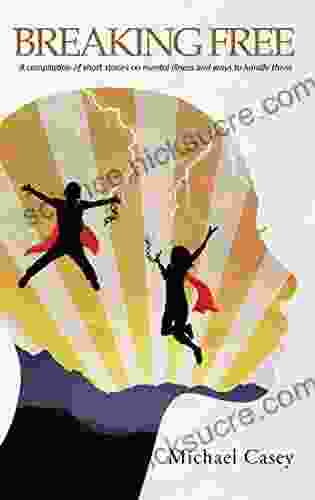
 Deacon Bell
Deacon BellCompilation of Short Stories on Mental Illness and Ways...
Mental illness is a serious issue that affects...

 Jonathan Hayes
Jonathan HayesThe Practical Guide to Raising Courageous and...
As parents, we all want...

 Carlos Fuentes
Carlos FuentesA Journey to Remember: The High Sierra Love Story of...
Prologue: A Wilderness Encounter Beneath...
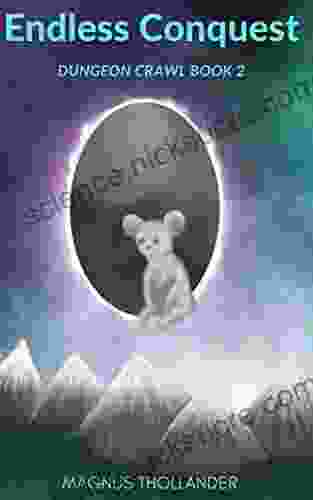
 Douglas Foster
Douglas FosterEndless Conquest: Embark on an Immersive Dungeon Crawl in...
Endless Conquest is a captivating LitRPG...
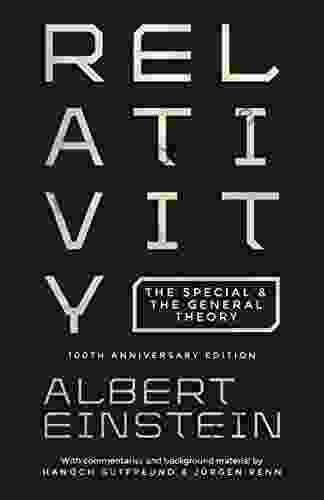
 Caleb Long
Caleb LongThe Special and the General Theory 100th Anniversary...
The year 2015 marks a...
4.7 out of 5
| Language | : | English |
| File size | : | 2243 KB |
| Text-to-Speech | : | Enabled |
| Screen Reader | : | Supported |
| Enhanced typesetting | : | Enabled |
| Word Wise | : | Enabled |
| Print length | : | 176 pages |


